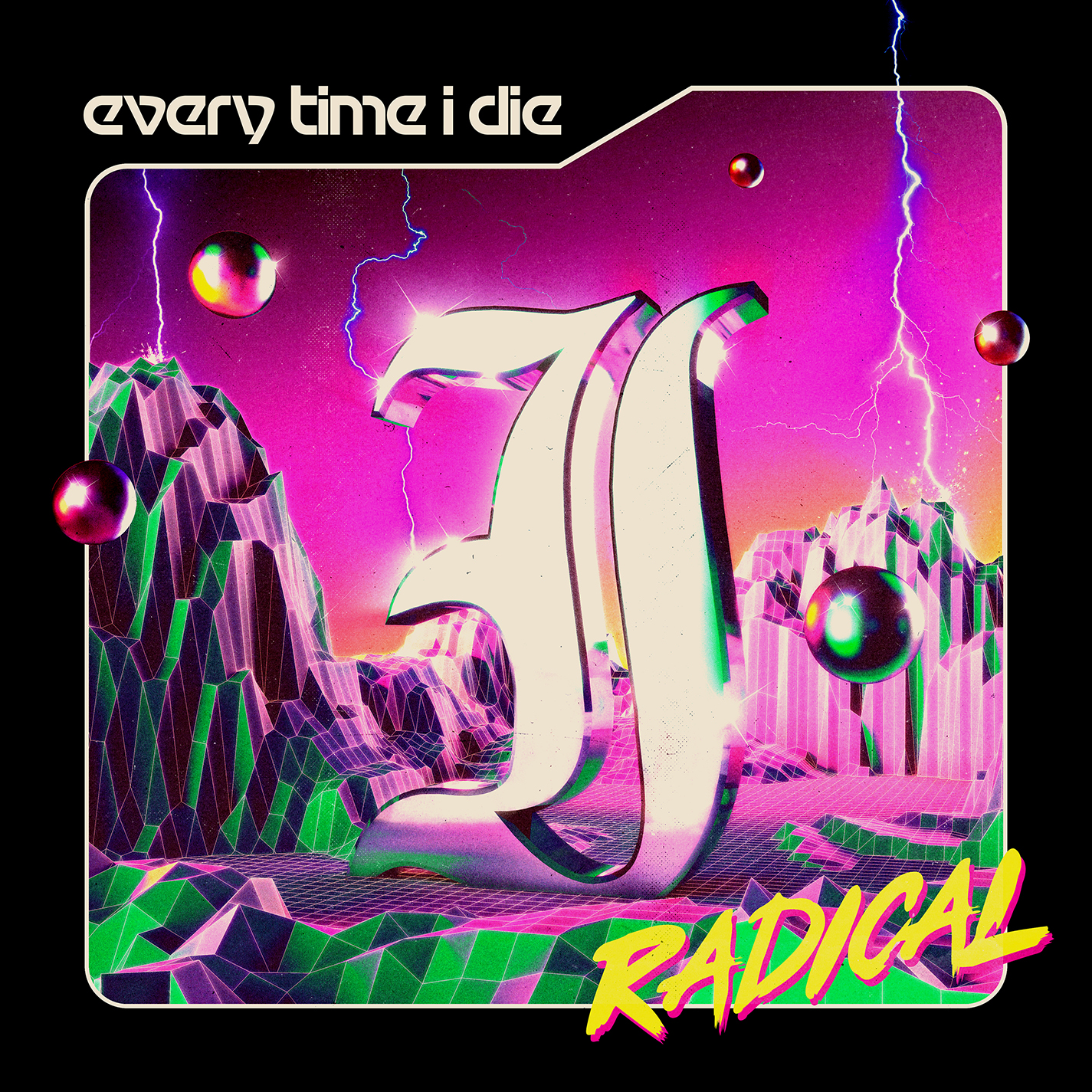
Every Time I Die
October 20, 2021| Noizze | RELEASE REVIEW

Every Time I Die – Radical | Album Review
“Our revels now have ended”, uttered Prospero in Shakespeare’s The Tempest. Every Time I Die frontman and lyricist Keith Buckley knows of this darkness.
The once hard-partying, hard-living vocalist has spent much of the last decade obliterating the persona he’d developed over the course of the band’s early career. Around the time of 2014’s savage reinvention From Parts Unknown, Buckley began talking of how unhappy he was with his sardonic public image, and the lyrics of that album talk of spiritual rebirth, of collapsing your sense of self in order to rise from its ashes. This reinvention corresponded with a career-best album that was crisp, confident and punishingly heavy.
However, this resurrection would suffer a setback. The shadow reared its ugly head again around the time of 2018’s Low Teens – a bleaker, stranger but no less brilliant album that featured lyrics inspired by the complications surrounding the birth of Buckley’s child. The often harrowing subject matter found him questioning his hard won rebirth, and wondering whether any of it was worth it, when faced with a world that contains such pain. 2021’s Radical continues this line of profound existential questioning, one complicated by further troubles in Buckley’s personal life and the abject state that our planet now finds itself in.
Every Time I Die have rarely, if ever, tackled political themes. 2008’s ‘Organ Grinder’ attacks an overreaching culture of surveillance, but other than that the Buffalo band’s thematics have always erred more towards the personal than the political. Radical wholly collapses this distinction, and the boundary between the global apocalypse and Buckley’s personal one becomes inexorably intertwined. The horrorshow politics of the last few years is burned into the DNA of the album, resulting in the nihilistic ‘A Colossal Wreck’, the frantic ‘Desperate Times’ and the provocative ‘Planet Shit’. ‘Planet Shit’ is outrageously entertaining, and Buckley’s blunt cries of “fuck you die” over the breakdown are the perfect visceral response to the evils enacted by the monsters that currently govern us.
Compounding this is the matter of Buckley’s marriage, which he has confirmed to have recently ended. Radical’s lyrics are littered with references to its collapse, often varying in their tone. ‘Thing With Feathers’ approaches it with melancholy, ‘AWOL’ analyses the reasons behind its ending, while ‘Hostile Architecture’ is confused and aggrieved, asking “what did I do wrong?”. Each comes from a different emotional headspace, mirroring the splintered confusion that comes with a breakup. Buckley is a sophisticated enough wordsmith to intentionally blur the lines between his personal strife and the broader global turmoil. Opener ‘Dark Distance’ begs “now give us our plague” and ‘White Void’ proclaims “by the time we saw the sun it had set”. This gives the lyrics the quality of a psychological puzzle box, raising fascinating questions of who these lyrics are addressed to.
The band’s songwriting is virtuosic enough to match these variations in emotional tenor. Jordan Buckley and Andy Williams are two of the best riff writers in heavy music, switching from discordant to soulful to anthemic with an elegance that belies the music’s intensity. They’re also masters of transitions between riffs, which makes their structurally-ambitious songs flow intuitively – check you the fluidity and momentum built up by ‘AWOL’ or ‘Distress Signal’. ‘Distress Signal’ is one of Every Time I Die’s heaviest tracks, featuring anguished vocals, blastbeats and not one but two incendiary breakdowns. The fact that eight albums in Every Time I Die are still pushing themselves to go heavier is so impressive, in fact there’s very few bands that have managed this so brilliantly.
They’re also still deeply curious and keen to experiment. The Andy Hull-featuring ‘Thing With Feathers’ is the closest thing to an indie rock anthem that Every Time I Die have ever crafted, while ‘Post-Boredom’ contains a heart-wrenching chorus that’s practically transcendent in its sense of realisation. Closer ‘We Go Together’ is the album’s most singular work of brilliance. A doom-leaden, sludgy behemoth, it concludes the album on a fittingly apocalyptic note. Compare the track to previous album closers such as ‘Indian Giver’ or even ‘Map Change’, and you realise just how sophisticated Every Time I Die have become as songwriters.
It’s genuinely hard to find anything wrong with Radical. It’s the band’s longest album and you can tell which of its sixteen tracks (‘The Whip’, ‘sexsexsex’) would have been cut and released as bonus tracks on a previous, non-delayed release. However even these few comparatively weaker moments contain more imagination and intelligence than most bands muster across their whole careers. This band are true masters, who long ago transcended genre. Radical is a work of metallic art that channels both the horrors of our age and those that we inflict upon ourselves with breathtaking vigour and a palpable sense of emotional honesty. It’s a staggering achievement, even by its creators’ lofty standards.



